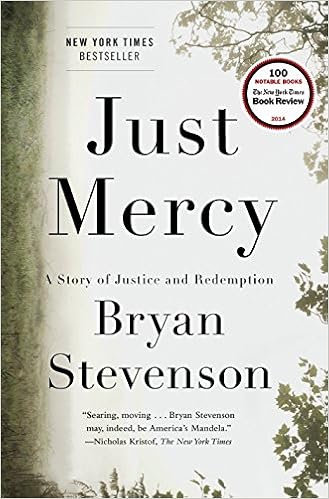Advocacy
A large part of the Correctional Ministries and Chaplains Association is Advocacy. The humanity of the incarcerated is overlooked when someone commits a crime. It is important to raise awareness that being incarcerated doesn’t take away from their humanity inside and outside of the correctional facility. As members of Correctional ministries it is our duty to remind the people who are incarcerated that there is always hope and that incarceration does not mean the end for their lives.
Recommended Books

Bryan Stevenson was a young lawyer when he founded the Equal Justice Initiative, a legal practice dedicated to defending those most desperate and in need: the poor, the wrongly condemned, and women and children trapped in the farthest reaches of our criminal justice system. One of his first cases was that of Walter McMillian, a young man who was sentenced to die for a notorious murder he insisted he didn’t commit. The case drew Bryan into a tangle of conspiracy, political machination, and legal brinksmanship—and transformed his understanding of mercy and justice forever.
Just Mercy: A Story of Justice and Redemption by Bryan Stevenson

The United States has more people locked up in jails, prisons, and detention centers than any other country in the history of the world. Mass incarceration has become a lucrative industry, and the criminal justice system is plagued with bias and unjust practices. And the church has unwittingly contributed to the problem. Dominique Gilliard explores the history and foundation of mass incarceration, examining Christianity’s role in its evolution and expansion. He then shows how Christians can pursue justice that restores and reconciles, offering creative solutions and highlighting innovative interventions. The church has the power to help transform our criminal justice system. Discover how you can participate in the restorative justice needed to bring authentic rehabilitation, lasting transformation, and healthy reintegration to this broken system.
Rethinking Incarceration: Advocating for Justice that Restores by Dominque DuBois Gilliad
Resources
The First Step Act: Ending Mass Incarceration in Federal Prisons
This brief is by the Sentencing Project. The recidivism rate among people who have benefitted from the law is considerably lower than those who were released from prison without benefit of the law. Among the nearly 30,000 individuals whose release (federal prison) has been expedited by the First Step Act, nearly nine in every 10 have not been rearrested or reincarcerated.
Winnable Criminal Justice Reforms 2022
This briefing put out by the Prison Policy Initiative highlights a number of promising state reform issues for 2022.
Americans with Criminal Records: Poverty
This summary article charts data from several sources on mass incarceration and hyper-criminalization serving as major drivers of poverty.
The Color of Justice-Racial & Ethnic Disparity in State Prisons
This report by The Sentencing Project documents the rates of incarceration for whites, African Americans, and Latinx individuals, providing racial and ethnic composition as well as rates of disparity for each state.
Justice Reinvestment Initiative–Maximizing State Reforms Report The Justice Reinvestment Initiative (JRI) is a data-driven process to improve public safety by helping jurisdictions make more effective and effcient use of criminal justice resources to address the complex factors that drive crime and recidivism. JRI seeks to reinvest cost savings into strategies that enhance public safety, decrease crime, and reduce recidivism.
A Second Look at Injustice This report by the Sentencing Project reveals that lawmakers and prosecutors have begun pursuing criminal justice reforms that reflect a key fact: ending mass incarceration and tackling its racial disparities require taking a second look at long sentences.
Transforming Prisons, Restoring Lives: Final recommendations from the Charles Colson Task Force On Federal Corrections
April is Second Chance Month
Since launching the first Second Chance™ Month in 2017, Prison Fellowship has spearheaded the nationwide effort to raise awareness about these barriers and unlock brighter futures for people with a criminal record.
A Prosecutor’s Vision for a Better Justice System | TED2016 | Adam Foss
When a kid commits a crime, the US justice system has a choice: prosecute to the full extent of the law, or take a step back and ask if saddling young people with criminal records is the right thing to do every time. In this searching talk, Adam Foss, a prosecutor with the Suffolk County District Attorney’s Office in Boston, makes his case for a reformed justice system that replaces wrath with opportunity, changing people’s lives for the better instead of ruining them. By shifting his focus from incarceration to transforming lives, Adam Foss is reinventing the role of the criminal prosecutor.
Prison Reform: The First Step Act
The FIRST STEP Act will ensure people are prepared to come home from prison job-ready and have major incentives to pursue the life-changing classes that will help them succeed on the outside. Currently, the federal prison system is failing to achieve its purpose – rehabilitation- and instead rips people away from their families, leaves them with fewer opportunities than when they entered into the system, and ultimately decreases public safety.
The First Step Act, short for Formerly Incarcerated Reenter Society Transformed Safely Transitioning Every Person Act, or H.R.5682 is a bipartisan prison reform bill passed by the House of Representatives on May 22, 2018. The bill’s timid reach is evident in its name, indicating the bill is only the first step in reforming the federal criminal justice system, with future reform on the horizon. Learn more about the First Step Act.
Pros and Cons of the First Step Act. Equal Justice Under Law takes no position on the FIRST STEP Act in supporting or opposing it. We do acknowledge its strengths and weaknesses. We have developed a list of pros and cons for informational purposes to better educate our supporters and the general public.
Juvenile Justice Reform Act 2018
This document summarizes the reauthorization of the Juvenile Justice Reform Act. Core areas addressed in the act include: Racial and Ethnic Disparities, sight and sound/jail removal and deincarceration of status offenses.
